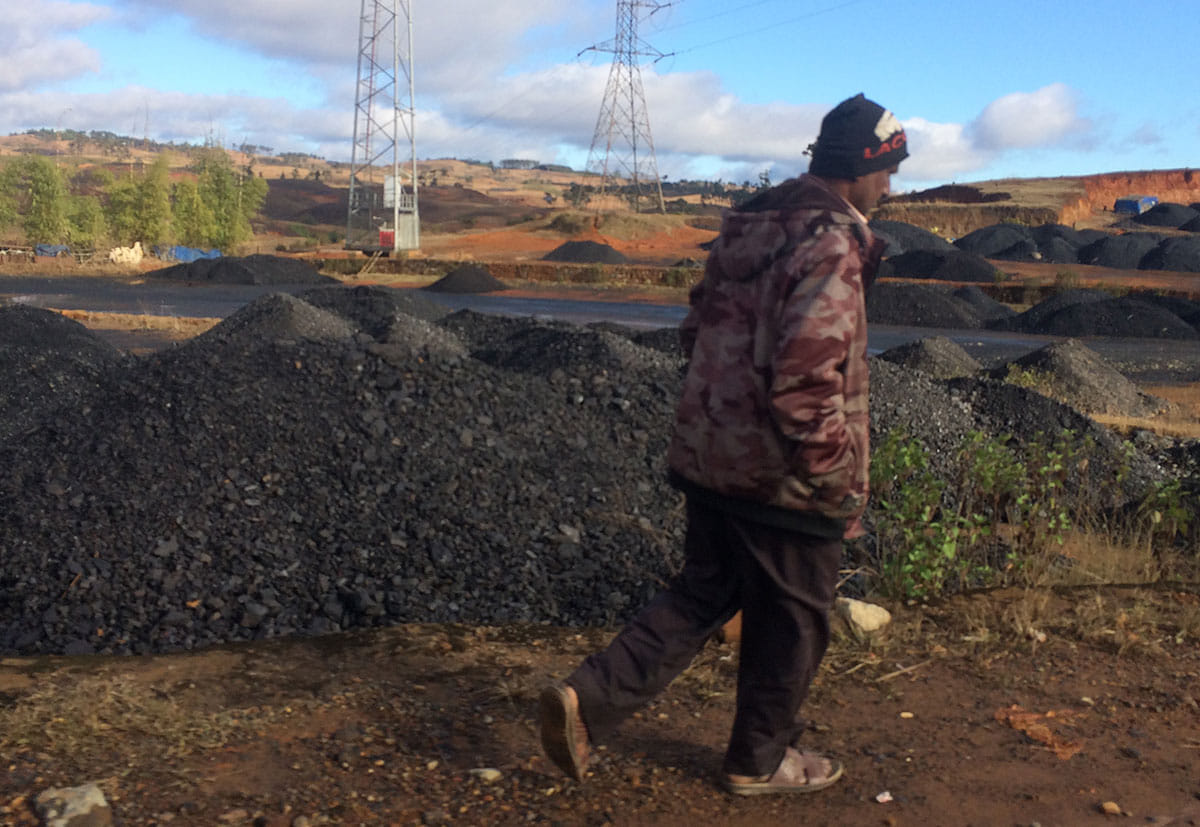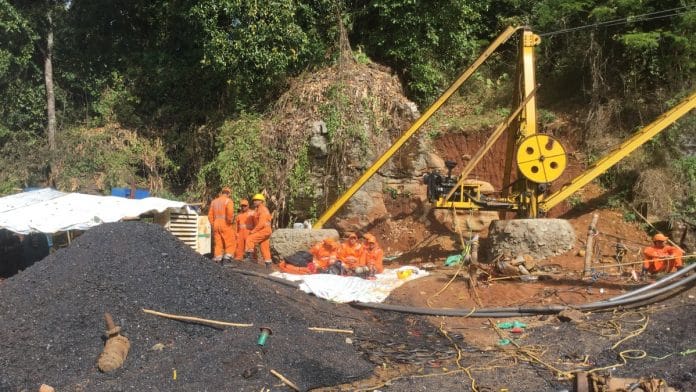Coal mining is said to be a big revenue generator for Meghalaya, where the collapse of an illegal mine this month left 15 people feared dead.
Khliehriat (East Jaintia Hills): That the 2014 National Green Tribunal (NGT) order banning rat-hole mining in Meghalaya, the predominant way of digging out coal in the state, is being flouted with abandon is an open secret.
But to see just how blatantly can still be unsettling.
While driving down the 30-km stretch from Khliehriat, the headquarters of East Jaintia Hills district, to Jowai, its West Jaintia Hills counterpart, one can see heaps of freshly mined coal strewn on both sides of the road. All through, labourers are seen loading the coal on to parked trucks.

Ask anyone where the coal has come from, and they feign ignorance. “We don’t know. We just work here,” said a 30-something man who refused to give his name.
Also read: The political problems that are stopping Modi from moving away from coal
Safety of miners
It’s not very far away from here that families of at least 15 miners are waiting for a word about their loved ones, who have been trapped inside an illegal rat-hole mine in Ksan, East Jaintia Hills, since it got flooded on 13 December.
The safety of miners was among the reasons cited by the NGT when it cracked down on illegal mining in Meghalaya, where coal is a big source of revenue, four years ago.
But not only is mining continuing unabated, owners turn a blind eye to all kinds of safety norms for miners, most of whom are poor daily wagers from nearby villages and adjoining states.
At the Ksan mining site, the only safety gear the miners got was a plastic helmet.
Talking to ThePrint, East Jaintia Hills superintendent of police Sylvester Nongtnger said they didn’t have enough manpower to implement the NGT order.
“It’s not that we are not taking action,” he said. “A number of cases have been registered against illegal miners. But we have an acute paucity of manpower… That’s all I can say. We have requisitioned more forces from the state government.”
‘We know coal mining is going on’
Former Gauhati High Court judge B.P. Katoki heads a three-member panel appointed by the NGT this August to study the steps taken to heal the state’s environment from the damage caused by rat-hole mining.
He told ThePrint the panel was aware about the violations.
“We also noticed the heaps of coals when we visited Khliehriat,” he said. “When the people saw us coming, they put a blue tarpaulin over the coal heaps. Do they think we are stupid?
“We will submit our report to NGT this month,” he added. “We will state in our report that illegal mining is rampant despite the ban. Even the district administration of East Jaintia Hills has admitted to us on the record that illegal mining is happening.”
The judicial panel, however, cannot take any action, he said, as it is beyond their mandate. “Our mandate is to submit a report and we are doing that,” he added.
The Meghalaya government has moved the Supreme Court against the NGT’s 2014 order banning rat-hole coal mining, as well as the August 2018 directive by which the Katoki-led panel was constituted. The case is likely to come up for hearing on 15 January.
In 2015, the miners had challenged the NGT’s ban on transportation of coal mined prior to 2014. On 4 December this year, the SC allowed the transportation of coal mined before 2014, setting 31 January 2019, as the deadline to complete this process.
“The miners are taking advantage of this SC order and transporting freshly mined coal too, which is illegal,” Katoki said.
A politician-miner nexus?
A recent report, compiled voluntarily by a group of social activists and environmentalists from the state and submitted to the Supreme court-appointed amicus curiae in the case filed by the Meghalaya government, sought to point out how unregulated and illegal coal mining in the state was destroying the environment and dispossessing tribal people of their land and livelihood.
It named many of the state’s cabinet ministers, MLAs and opposition leaders, as well as their family members, as owners of coal mines.
Former Meghalaya home minister R.G. Lyngdoh said he agreed with the report’s findings. “It appears there is complicity between the administration, local mine owners and politicians across the political spectrum,” he said. “How else do you think it is going on so openly under everybody’s nose?”
Environmentalist and church leader H.H. Mohrmen added, “Without political patronage, it can’t happen so easily.
“It’s not only mining,” he added. “Transportation of the coal is also a lucrative business. Transporters find it more profitable to transport coal illegally as they do not have to pay any tax except bribing police.”
Also read: 13 trapped in Meghalaya coal mine feared dead as rescue efforts over 5 days remain futile
‘A source of livelihood for many’
Lyngdoh, however, said one also needed to pay attention to another aspect of the whole issue that “seems to have been overlooked completely”.
“There is a whole layer of dailywagers and people without land who depend on mining, at times risking their lives, for livelihood,” he added.
Lyngdoh said that if mining had to be shut down completely, a concerted effort was needed to create alternative livelihood opportunities.
“A direct result of the timber ban in the early 1990s was the rise in militancy among youth,” he added. “We have to learn from history.”
The role of traditions
Unlike other states where land is controlled by the government’s revenue department, in Meghalaya, it is held by people.
“Land here is mostly private, clan land or community land, held under their customary land laws,” said John F. Kharshiing, chairman of the Grand Council of Chiefs of Meghalaya.
“Meghalaya is one of the four northastern states that come under the sixth schedule of the Constitution, which allows protection of tribal rights over land,” he added.
According to him, the Centre, the state government, legislators, MPs — all past and present — are also responsible for the “unfortunate situation” in the state. “To date, they have failed to resolve the constitutional anomaly where the central laws are in conflict with customary social laws and practices,” he said.






